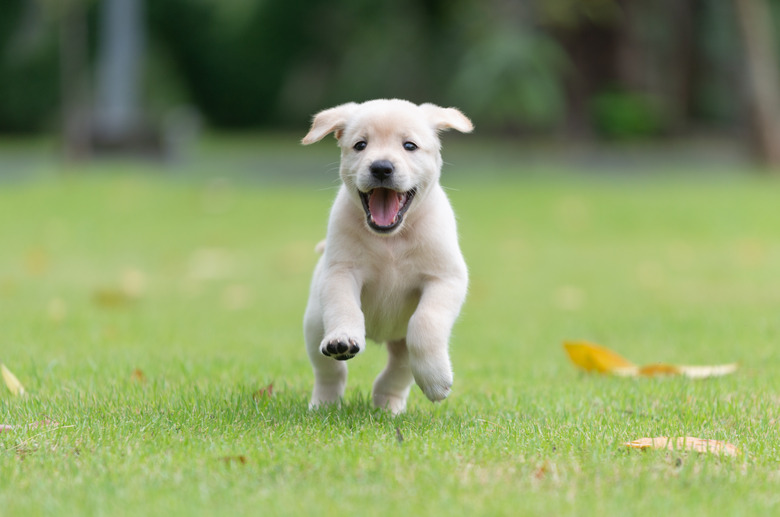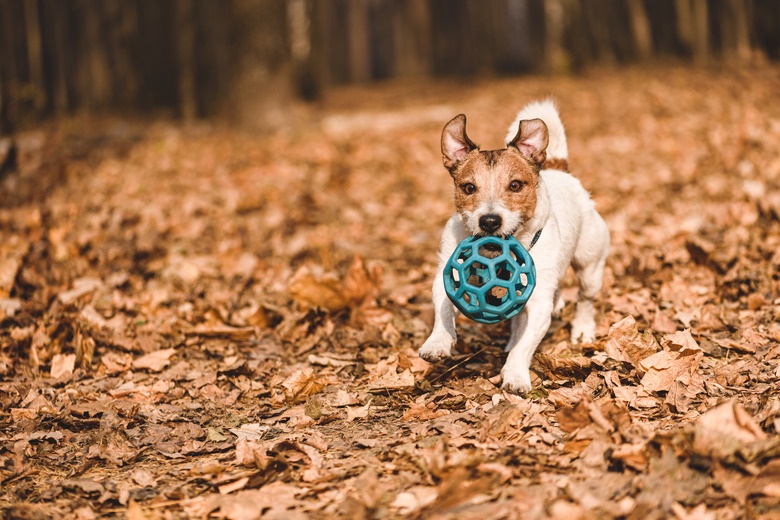How To Stimulate A Puppy To Poop
The life of a puppy is mostly spent eating and sleeping, with several much-needed bathroom breaks peppered in between. However, not being able to poop can cause both discomfort and potential health issues for young dogs, especially newborn puppies. For litters who are with their mother, mom can help stimulate bathroom functions by licking her puppies, which encourages regular bowel movements.
Sometimes, however, a puppy's pet parent might need to step in to assist, either because mom isn't in the picture or because other medical issues are present, such as constipation. Stimulating a potentially constipated puppy to go potty is an important part of canine health and can be done in a few ways.
Causes of puppy constipation
Causes of puppy constipation
All puppies need help using the bathroom until they reach a certain age, which is usually 3 to 4 weeks old. Therefore, if your pup is younger than 3 weeks old, they will not be able to use the bathroom without help from someone, usually the dog mom.
Puppies who are a bit older might still have trouble eliminating if their diet is too low in fiber or if they have underlying medical issues, such as:
- Worms
- Spinal diseases
- Blockage inside the colon
- Disorders of the central nervous system
How to make a puppy poop: three ways that work
How to make a puppy poop: three ways that work
Puppies need help with almost everything immediately after they're born to stay alive and well. It's very important to help your puppy use the bathroom if their mother isn't around or if they are having trouble going because neglecting a dog's needs can result in serious medical problems.
How to get your puppy or puppies to poop and pee after they've eaten:
- Use a lightly moistened cotton ball to mimic a mother dog's tongue. If they are less than 4 weeks old, take a clean towel or a cotton ball and lightly wet it. Then, use it to gently massage your puppy's genital region in a circular motion, which will stimulate a bowel movement.
- Give your pooch regular exercise if they are more than 4 weeks old. These puppies are unvaccinated, so public walks put them at risk for picking up parvo or other communicable diseases. Either walk them in your enclosed yard, as long as you haven't had a parvo positive dog leave feces in your yard, or keep exercise to indoor activities.
- Provide plenty of fresh, clean water, especially for weaned puppies. This can include warm water with electrolytes formulated for pets if you have a dehydrated dog. But dehydrated puppies need veterinary attention. You won't be able to properly rehydrate a dehydrated puppy by trying to get them to drink more.
Fiber for puppy constipation
Fiber for puppy constipation
If you're a dog owner of a weaned puppy that has become constipated, and your veterinarian has determined that your pup doesn't have intestinal parasites, the most common suggestion will be to adjust the dog's diet to feature more fiber or water. Switching to wet food or canned dog food if your puppy is eating dry kibble is a good place to start, and adding high-fiber canned pumpkin puree has also been known to settle an upset stomach and aid in digestion.
However, talk to your veterinarian about how much pumpkin to feed a puppy; more isn't necessarily better. Additional problems can be created by introducing too much fiber to a dog's diet. Also, talk with your veterinarian before making diet changes. Abrupt diet changes can cause diarrhea. Though this might sound like a move in the right direction, puppies with diarrhea become dehydrated very quickly, and that requires veterinary care.
Never give a dog or puppy human laxatives. Instead, you can talk to your veterinarian about adding a psyllium fiber supplement, like Metamucil, to your dog's diet to help keep them regular.
Concerns with newborn dog constipation
Concerns with newborn dog constipation
For a newborn puppy, constipation can be a very serious health issue, and it's recommended that you contact your veterinarian immediately, especially if you're the pet parent of a puppy that is still too young to be eating anything more solid than milk or a milk replacement. Unweaned puppies with constipation require veterinary care and should not be treated with home remedies.
Very young puppies who are constipated won't feel well and won't nurse as much as they should. Note that hypoglycemia, when the glucose level is lower than average, is a serious issue and a potential result of a newborn puppy not nursing enough.
Note that chronic constipation in puppies is highly unusual, so regular occurrences are definitely a concern because that suggests a serious underlying condition. In these cases, X-rays and abdominal ultrasound might be required.
The bottom line
The bottom line
Very young puppies, especially newborns, need help defecating. Mother dogs usually help puppies, but if that's not possible you might need to stimulate the rectal region with a moist cotton ball to make a dog poop. Constipation can cause health problems or can be a symptom of serious issues. Giving weaned puppies pumpkin puree can help but in limited quantities. Consult a veterinarian for the correct dosage. Never give a dog or puppy human medication, including laxatives or stool softeners. Unweaned puppies with constipation require veterinary care and should not be treated with home remedies.


